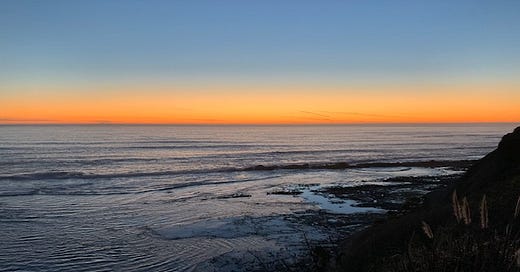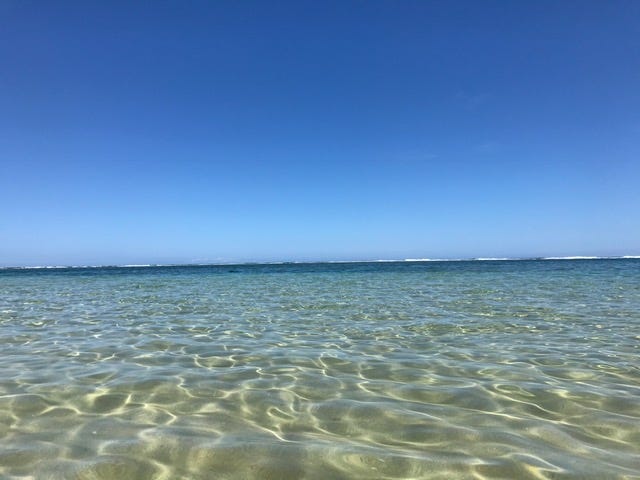Coming Home
THE NATURE OF US writings on the earth community, love, body, embodiment, interconnection, our planetary moment, music - and the creativity and possibilities inherent in being human.
I am celebrating the two year anniversary of these essays. This favorite of mine is still timely.
There is a love that runs through us, arising from the source of everything, which nourishes the world. It can be most tangibly felt in nature. This love aligns our spiritual, mental, emotional and physical levels - and it expresses through our physical bodies. Unless it is conditioned out of us, we are inherently drawn to what we love. As we grow and integrate to express ourselves fully, we open into our unique and individual nature. Paradoxically, this pure individuality allows us to feel our part in the moving whole, as a magnificent expression of the ongoing dance of creation.
The poem by Mary Oliver, Wild Geese, so beautifully captures this dynamic:
You do not have to be good.
You do not have to walk on your knees
for a hundred miles through the desert repenting.
You only have to let the soft animal of your body
love what it loves.
Tell me about despair, yours, and I will tell you mine.
Meanwhile the world goes on.
Meanwhile the sun and the clear pebbles of the rain
are moving across the landscapes,
over the prairies and the deep trees,
the mountains and the rivers.
Meanwhile the wild geese, high in the clean blue air,
are heading home again.
Whoever you are, no matter how lonely,
the world offers itself to your imagination,
calls to you like the wild geese, harsh and exciting --
over and over announcing your place
in the family of things.
* * *
This poem has been with me for years as ‘words to live by’. I love how she zeroes in on our efforts to be good, or how we cannot forgive ourselves. In this first paragraph she sums up the weight of culture with the many ways we need to be, should be, and then sweeps it away with the last sentence:
You only have to let the soft animal of your body love what it loves.
The soft animal, the sweet innocence, the child within that purely loves, the one who simply reaches out in response to a feeling. When we pay attention to the space within the body and listen to its promptings there is a continual signalling of direction, from the most simple ‘drink water now’ to the more complex decisions. Everything filters and sifts through us until that impulse to act. Then we spontaneously move on our individual knowing, feelings and everyday preferences. Or sometimes the deep silence pulls us even deeper. We are drawn to what we love, whether deep inside or in our surroundings. In this way we begin to embody our unique nature.
Yet sometimes I am simply in my head, endlessly thinking things over, paralyzed with indecision. And there is the part of me, full of things pushing to the forefront before I can do what I want to do, what I love to do. The culture I live in supports this fragmentation, modeling disconnection and over-thinking, exhorting us to achieve and accomplish goals, suggesting that life lived from our bodies is dangerous and impulsive. We have been taught to distrust the body’s knowing, learned to question gut instincts and not value or even notice our embeddedness in the earth community.
From the prefrontal cortex of our brain (behind our forehead) we think and ponder, looking down at the rest of our body from a distance. Yet if I move my awareness to the back of the head, to the cerebellum on either side directly above the neck, I move down into body territory, sensing instead of thinking. The cerebellum is responsible for movement, posture and balance, thus attention is directed downwards to the entire body. It’s fun to play with this. Allowing our awareness to sit in the cerebellum enables us to feel our bodies from the inside, to bring our awareness within the torso, belly, pelvis or legs.
When I am walking, my mind moves towards silence as I center in the cerebellum and my awareness spreads throughout my body and out to the trees on each side. Then a thought pops in and I am back to the prefrontal cortex, more removed from my body and nature. Explore moving back and forth, see if you can feel these different ways of paying attention.
It is our thoughts that tend to lead us into overdoing or extremes, not our soft animal body knowing. Body notices when the belly is full, body knows when it is satisfied, body loves to move and be in nature. And like any animal, our bodies love to play and explore our surroundings. It is the thinking mind that tends to be unsatisfied, craves more and more, compares itself to others, and is never good enough. I was raised to live in my thinking mind. Yet what I have found over the years is that learning to fully live in my body, embodying and feeling my unique human nature, is far more satisfying.
Of course, there are times I go back and forth between head and heart/animal body, engaged with discerning and setting boundaries with my self. Is this really what I love, what I am drawn to now? Or is it an old way that is my habitual default? It takes practice to discern what is most true in each moment. You only have to let the soft animal of your body love what it loves is a way of being, the work of a lifetime.
* * *
In the second paragraph Oliver speaks of how we can share our despair with one another, connect with one another. Even in our darkest moments the natural rhythms continue, all around us the world is moving and changing in each moment, just as we are. And there is the comfort of rituals that repeat over and over, nothing out of step, it’s the time of the year for the geese to head home. Again. The intelligence of nature surrounds us, the seasons return. And again, moving home, the comfort and safety of home awaits.
Tell me about despair, yours, and I will tell you mine.
Meanwhile the world goes on . . . .
Meanwhile the wild geese, high in the clean blue air, are heading home again.
Every one of us is a part of this moving whole, called over and over to wonder by the beauty surrounding us. The world draws us to her, stimulating our creativity. We become fascinated with the migration patterns of birds, or design a plane based on how they fly. The sun exhilarates us, the deep waters call us to dive under and explore the ocean depths, and the snows inspire us to create sledding, skiing, snowboarding, all to play on wintry slopes. And then sometimes it is a simple walk in nature that changes us, many creative ideas arise when walking.
Whoever you are, no matter how lonely,
the world offers itself to your imagination,
calls to you like the wild geese, harsh and exciting —
over and over announcing your place
in the family of things.
This last line, announcing your place in the family of things echoes the theme of the geese heading home. We are family with all our relations. Everything matters. Each member of the family carries that thread of love emanating from their source. The animals, birds and trees, the water, sun and air express it freely. In humans it is more or less obvious, depending on the film of separation that encases some. Yet the world offers itself to your imagination. It is our receptivity to the world that enables us to feel at home, to answer the call. As we absorb and fill with the love all around us, we resonate together as family, as community.
* * *
I will leave you with a bit of prose from Mary Oliver from her book Upstream that underlines how our imagination is inextricably linked with the world:
For the universe is full of radiant suggestion. For whatever reason, the heart cannot separate the world’s appearance and actions from morality and valor, and the power of every idea is intensified, if not actually created, by its expression in substance. Over and over in the butterfly we see the idea of transcendence. In the forest we see not the inert but the aspiring. In water that departs forever and forever returns, we experience eternity.
with love,
Sabrina
Thanks for joining me here today!
Sabrina Page, MA in Philosophy, Cosmology and Consciousness, writer, facilitator, and astrologer. My background includes working with individuals and groups, with a focus on somatic inquiry and embodiment to support you in living life fully, freely and fluidly, intertwined with nature. As well, I have studied movement, dance and astrology with some of the leading individuals in their fields. My private sessions are offered on zoom, phone, or in person in Albion, California.
More information is available on my website, sabrinapage.com
THE NATURE OF US is a reader-supported publication. To receive new posts and support my work, consider becoming a free or paid subscriber. Free and paid subscribers receive identical content. If you want to support and encourage me a little extra, and your finances are OK, please choose paid subscription.





I just love this post, and the Mary Oliver poem you shared. It has been a touchstone for me too, reminding me about the soft animal nature that is a cherished part of my life and experience. Thank you!